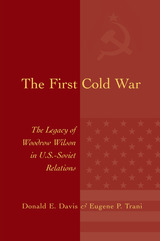2 books about U . S - Soviet Relations

The First Cold War
The Legacy of Woodrow Wilson in U.S. - Soviet Relations
Donald E. Davis & Eugene P. Trani
University of Missouri Press, 2002
In The First Cold War, Donald E. Davis and Eugene P. Trani review the Wilson administration’s attitudes toward Russia before, during, and after the Bolshevik seizure of power. They argue that before the Russian Revolution, Woodrow Wilson had little understanding of Russia and made poor appointments that cost the United States Russian goodwill. Wilson later reversed those negative impressions by being the first to recognize Russia’s Provisional Government, resulting in positive U.S.–Russian relations until Lenin gained power in 1917.
Wilson at first seemed unsure whether to recognize or repudiate Lenin and the Bolsheviks. His vacillation finally ended in a firm repudiation when he opted for a diplomatic quarantine having almost all of the ingredients of the later Cold War. Davis and Trani argue that Wilson deserves mild criticism for his early indecision and inability to form a coherent policy toward what would become the Soviet Union. But they believe Wilson rightly came to the conclusion that until the regime became more moderate, it was useless for America to engage it diplomatically.
The authors see in Wilson’s approach the foundations for the “first Cold War”—meaning not simply a refusal to recognize the Soviet Union, but a strong belief that its influence was harmful and would spread if not contained or quarantined. Wilson’s Soviet policy in essence lasted until Roosevelt extended diplomatic recognition in the 1930s. But The First Cold War suggests that Wilson’s impact extended beyond Roosevelt to Truman, showing that the policies of Wilson and Truman closely resemble each other with the exception of an arms race. Wilson’s intellectual reputation lent credibility to U.S. Cold War policy from Truman to Reagan, and the reader can draw a direct connection from Wilson to the collapse of the USSR. Wilsonians were the first Cold War warriors, and in the era of President Woodrow Wilson, the first Cold War began.
[more]

Sectors of Mutual Benefit in U.S.-Soviet Relations
Nish Jamgotch, Jr., ed.
Duke University Press, 1985
A distinguished panel of analysts examines particular areas of U.S.-Soviet cooperation: crisis communications , trade, science, agriculture, environment protection, space and medicine. The authors analyze agreements that the United States and the Soviet Union have revolved in their mutual interest, agreements that all too often are overlooked in an atmosphere clouded by hostility and mutual distrust. What, they ask, has been the history of these agreements? Have they succeeded or failed? How might they best be sustained and enlarged?
Without minimizing the enormous dangers of ongoing strategic military competition, the contributors attempt to determine which sectors of U.S.-Soviet relations have yielded the most significant mutual benefits. They raise questions about where U.S. policy has gone wrong, where it has been effective, and how safe we are in forecasting the continuation of those cooperative relationships.
[more]
READERS
Browse our collection.
PUBLISHERS
See BiblioVault's publisher services.
STUDENT SERVICES
Files for college accessibility offices.
UChicago Accessibility Resources
home | accessibility | search | about | contact us
BiblioVault ® 2001 - 2024
The University of Chicago Press









